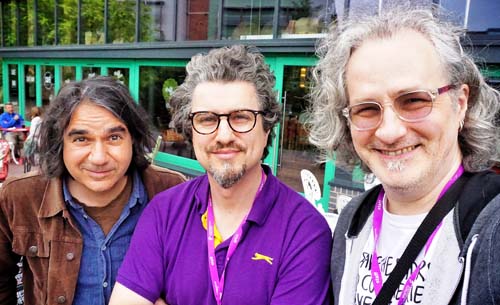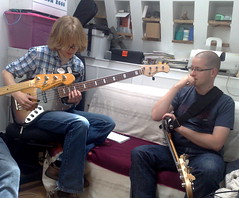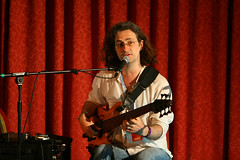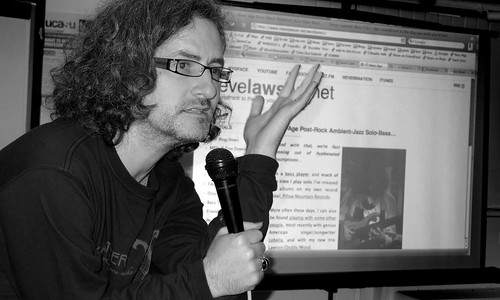So yesterday was my last day of one of my teaching jobs. It’s one I’d had for about 6 years (my longest ever non-self employed job), and one that was the beginning of my return to teaching actual courses rather than one-off masterclasses after a break of over a decade.
The real joy of it was working with these guys:
Phi Yaan-Zek and Andy Edwards are both such excellent teachers and musicians, and between us I don’t think we had a single conversation in the 6 years I was there that wasn’t on some level about how we could making teaching better. It was such a joy to work with these guys on trying to come up with innovative methods to help music students connect with their creativity in ways that were conscious of the cultural and economic environment they were moving into, but not deterministically bound by those constraints when considering the role of creative practice in changing culture… We were constantly looking for ways to inspire the students to dig deep into themselves and pursue something other than purely commercial measures of meaning and value for their work. And, judging by the parade of extraordinary creative people we helped release back into the wild, we did OK.
The context wasn’t ideal – HE in the UK is a tough area to work in right now wherever you are, all the moreso in a provincial college with no underlying commitment to creative practice or focus on the arts. We, like everyone else around the country in the many, many institutions like ours, were constantly trying to make something worthwhile for the students. There were times when we were REALLY good at that, and times when we struggled, but we still punched (and the course continues to punch) WELL above our weight in terms of the circumstances we were (are) in. The course wasn’t reliant on me for what made it good (Andy’s extraordinary legacy in inspiring music students in the West Midlands stretches back decades before he met me!), so will continue to provide a worthwhile education to the students there. And, while there’s a ton of nonsense that I won’t miss at all about being there, I’ll dearly miss these guys, and Meldra, who more recently came on board to teach the vocalists, and brought so much wisdom and experience to the team.
If you’re paying attention, you’ll know that Phi, Andy and I are LEYlines – so it’s not like we’re not going to be working together still making music, and I’m probably going to end up Skyping the pair of them to argue about Wittgenstein and Heidegger, Phenomenology and Aesthetics, and how the hell we turn this or that scheme of work into a course worth studying…
But for now, we’ve got a LEYlines album coming out this weekend, gigs to organise, and I’ve got a PhD to write that I’m 18 months behind on (the real reason I quit my job there). And come September, I’ll still be working at the one college teaching gig I’ve kept on, at BIMM here in Birmingham.
(BTW, this also means I may have more time for some more private Skype students, so if you want a bass lesson or two get in touch…)Â




